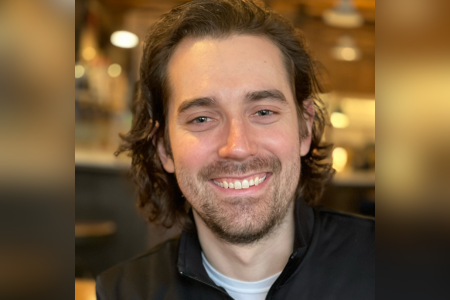Creators: On-set VFX Supervisor and Compositor Jimmy Smith

Jimmy Smith is a compositor and on-set visual effects supervisor who has been working at Alkemy X for over two years. As a compositor, he has worked on shows such as “The Walking Dead: Dead City”, “911”, “Evil” and “Colin in Black & White”. As an On Set Supervisor, he has worked on the TV shows “Power Book III: Raising Kanan” and “Power Book II: Ghost”.
AX: When figuring out your path as a professional, what was your lightbulb moment that made you realize this is what you wanted to do?
JS: I was at a new media event while at college. I was at an impasse in my college career as I was having doubts about whether my initial career path (law) was the best fit for me. But when I was told by one of the organizers that I could download a free version of a professional VFX software, I ran home and started teaching myself. I had always loved film and VFX, so knowing that I could train myself in the software the pros used inspired me to enter the industry.
AX: How do you help to create an effective and smooth collaborative environment when working on projects?
JS: I constantly keep my supervisors and managers in the loop of what I’m doing. Whether it’s telling them which shot I am currently working on or reporting what the client had said to me on set, I try my best to keep communication open and to be as accessible as possible when on the clock.
AX: What is the most exciting part of being on set?
JS: Watching the process of making a TV show never ceases to amaze me. It’s exciting to see how many talented people come together to get the final picture made. Being a part of that process and having a voice in the creation of that image is a huge honor.
AX: What is the most important tool that you use in VFX?
JS: It would be a tie between the compositing software NUKE and my iPad. Nuke is the backbone of my VFX knowledge and helps me know what data to collect while on set during a VFX shoot. My iPad helps me record my data and communicate with clients by drawing and annotating images to better explain the best approaches to film VFX.
AX: What is your proudest moment as a compositor?
JS: My proudest moment was probably when working on The Walking Dead: Dead City, the amount of shots involving killing zombies, adding zombies, and degrading buildings is something I’m most proud of. The shots look cool, they were fun to work on, and I learned a lot. It was a great time!
AX: Are there any new and upcoming technology/software you have been exploring?
JS: I’ve been trying to familiarize myself more with 3D softwares, with the intent of not only developing a new skill, but to better know what data to collect while on set. I’ve also been exploring more forms of data collecting for on set supervision, whether it’s a laser measuring device or a simple collection of multicolored tape to make tracking markers.
AX: What are some decisions you have to make while being on set? How do those decisions impact the final product?
JS: Some of the many decisions I’ve had to make while on set mostly concerned how to collect data and information. For the most part, I’ve had to ask for camera information, photos of actors and locations, and even takes with or without special effects. Overall, these decisions help us VFX artists later on when having to look up references as the best way to address a VFX shot or setup.
AX: What has been the biggest challenge for you working as a VFX compositor?
JS: Staying organized. The node-based UI of Nuke is perfect for the visually minded, but it can easily get cluttered. I’ve sometimes had to consciously stop working on a shot to clean up my nodes (we call these files “scripts”) so if anyone ever had to hop in and help out or take over, they would not be completely lost or confused.
Keeping my scripts organized also helps me see where there can be errors in my shot. Sometimes, a problem in a composite could be putting the right node in the wrong place. Staying organized helps me, though it is hard to do when on a tight deadline or working on a big shot.
AX: What’s a piece of advice you would give to someone entering VFX?
JS: Stay optimistic, and know that there is not one way to enter this industry or succeed in it. Just because one person started out as a roto artist at a major VFX studio, or a matchmover at a commercial house, doesn’t mean you have to as well.
